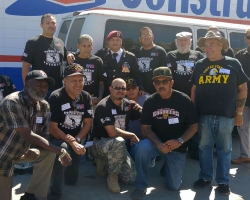In 1983, U.S. Marine Armando Scott was stationed in Beirut, Lebanon, when suicide bombers detonated two truck bombs that destroyed the barracks housing his unit. More than 300 people died in the attack, including 220 Marines, 18 sailors and 3 soldiers.
Scott survived the terrorist attack and helped pull the bodies out of the rubble.
Unfortunately, Scott, who was born in Panama, is now living in Tijuana. He is one of hundreds, perhaps thousands, of U.S. military veterans who have been deported from the country they once served with honor and distinction.
Deporting people who served in the military, such as Scott, is a shameful injustice that must be corrected. The ACLU of California along with several other organizations and a handful of congressional representatives are helping these veterans in their fight to come home.
Many of the deported veterans who live in Tijuana frequently get together at the Deported Veterans Support House, a resource center also known as “The Bunker.”
About a dozen veterans recently came there to meet with a delegation of U.S. congressional representatives, including Rep. Lou Correa of Anaheim and Rep. Mark Takano of Riverside.
During the meeting, the veterans and their families talked about their struggles living in a country that is as foreign to them as the countries they once served in. Some of the veterans are more fluent in English than they are in Spanish.
Some of them have health problems that stem from their time in the military, such as hearing loss and post-traumatic stress disorder (PTSD).
These cultural and health problems prevent them from getting good jobs and they struggle financially.
Scott said he was finally able to contact the Department of Veterans Affairs and received a medical appointment to assess his eligibility for health benefits. But the appointment was in Mexico City and he could not afford to make the trip. That means he will have to wait another six months or more for another appointment.
Sitting next to Scott was another veteran, Armando Javier Cervantes Hernandez, who struggled to stand with a pair of crutches and a brace around his knee.
“I need the VA. I need medical assistance to take care of my leg, because if I don’t have surgery I will have gangrene and they will have to cut it,” Cervantes said. “I don’t want to lose my leg. I don’t want my son to see his dad without a leg. I want to run with my son. I want to help him grow up to be a man.”
The veterans don’t lose the benefits they earned because they were deported. Some joke that only way they will be able to come back to the country they love is in a coffin because when they die they are eligible to be buried in a military cemetery – with full honors.
The problem is that the VA system is not set up to serve people living in Mexico and they are not allowed to the enter U.S. to access the care they need.
There are no statistics on how many veterans have been deported over the years because the government doesn’t keep track. But the Deported Veterans Support House, run by deported U.S. Army veteran Hector Barajas, has identified 239 veterans from 34 countries, according to a report compiled by the ACLU of California. That number is probably just the tip of the iceberg.
Changes in immigration laws in the mid-1990s made it easier for noncitizen veterans to be deported. For example, the Illegal Immigration Reform and Immigrant Responsibility Act, signed by President Bill Clinton in 1996, increased the range of crimes could render someone deportable and it does not permit a judge to consider defendants’ military service in deportation procedures.
Many of the deported veterans came to the U.S. as children. They served in combat in places such as Vietnam, Korea, Granada, Iraq and Afghanistan. Most say they were told by military recruiters that if they enlisted they would automatically become U.S. citizens. That is not true.
Although military service makes citizenship easier to obtain, service men and women must still apply and follow the citizenship process.
Several bills were introduced earlier this year, including some by Rep. Juan Vargas, that would require the military to establish a naturalization office at basic training sites to help noncitizen troops obtain their citizenship and another bill would require the Department of Homeland Security to track how many veterans are facing deportation.
Congressman Takano, who is a member of the House Committee on Veterans Affairs, said the delegation that visited The Bunker will write a report on the problems faced by deported veterans and look for solutions, such as improved access to medical benefits.
“Of course, many of us, me included, are fighting for the bigger aspirational goals of trying to address the issue of why you were deported in the first place and how do we get you back into the United States,” Takano said.
Lupita Lopez, the wife of a deported veteran, said she moved to Tijuana to be with her husband but their children and grandchildren remain in California.
“There comes a time when they divide families, they destroy families and it’s not just,” Lopez said. “When my husband’s father died he was not able to attend the funeral. It’s an injustice. They must be allowed to return to the country they pledged to defend with their lives. Now, the country needs to protect them.”
With the help of the ACLU, several deported veterans have received pardons from Gov. Jerry Brown that could be a first step in bringing some of them home to their families. But there is much to be done.
The ACLU will continue to call attention to this problem and ask the public to push lawmakers to introduce and pass legislation that will: prevent veteran deportations in the future, help deported veterans access the benefits they bravely earned and finally reunite them with their families in the country they love and consider their own.
Edward Sifuentes is the Senior Communications Strategist for the ACLU of San Diego and Imperial Counties.















